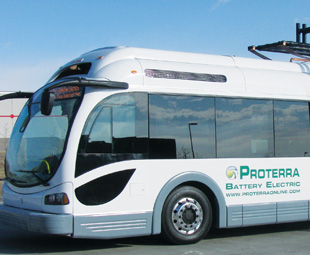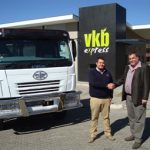Proterra’s electric predictions

FRANK BEETON reports on the latest electric-bus developments
Late last year we asked the question: “Are electric buses taking over?” The best answer that we can give right now is: “No, not yet”. However, the more we think about their potential to dominate the city and metropolitan public transport landscape, the more we are convinced that they may, indeed “take over”.
The development of alternative propulsion technologies for buses appears to have split into two distinct camps. The one, which is pursued mainly by some mainstream vehicle manufacturers, has followed the hybrid route, where varying forms of electric propulsion have been used to supplement the traditional combination of combustion engine/transmission/drive axle.
The other group has employed a “clean sheet of paper” approach, and applied pure electric traction by means of individual wheel motors, drawing current from batteries; recharged by on-board power units, or direct from the local power-supply grid.
In the second group, we have found some new names not previously seen in the ranks of bus manufacturers. We have frequently mentioned Chinese enterprise BYD in this column, most recently in connection with new electric buses for London, and now we have discovered an American company named Proterra, which seems to be taking a leading position in the development and manufacture of electric buses.
Initially founded in 2004, to explore the emerging demand for alternative fuel heavy-duty vehicles, the company has since concentrated its efforts on fast-charging electric buses. It started with a model named Ecoride and followed up with the Catalyst range of 11- and 12,1-m long units. At the last count, Proterra had supplied 155 electric buses to 15 North American transit authorities.
Current Proterra CEO, Ryan Popple, who, like several people in the electric vehicle business, was previously employed by Elon Musk’s Tesla enterprise, believes that all urban vehicles, including transit buses, refuse trucks, delivery vans and food trucks will be of the all-electric type in the next decade.
Popple believes that the game changer will be the rapidly reducing price of batteries, and the fast charging technology that is currently being developed.
Proterra’s own single-blade system offers five-minute charging for its buses, but other companies in China and Europe have reportedly achieved even faster charge rates, notably the ABB wireless system being used in Geneva, which enables a 15-second recharge at each bus stop.
As things stand, electric buses still cost more to procure than diesel vehicles. However, Proterra is offering a facility where private operators can lease the battery, to achieve an equivalent up-front purchase price for their electric units, allowing the owner to enjoy claimed savings in total lifetime costs when compared to diesel, hybrid or hydrogen-powered units.
The present alternative-driveline transit bus scenario contains an almost bewildering array of differing technical directions, many of which have been featured in this column over the past two years.
From our perspective, we can see a substantial benefit in the reduced technical complexity of the all-electric solution, which eliminates the need for a mechanical transmission, and enables ultra-low-floor saloon layouts without requiring portal or drop-centre axles.
Battery cost, size and mass has been the major stumbling block to all-electric traction in the past, but the present concentration of development effort in this area seems to be progressively removing that obstacle.
We do not think that the transition to all-electric power for all urban vehicles will be as swift as predicted by Ryan Popple, but we do expect considerable progress in that direction during the timeframe suggested. Inevitably, economics will determine the pace of transition, but our bet is that all-electric city buses will be the rising stars in developed markets in the years ahead.
Published by
Focus on Transport
focusmagsa




